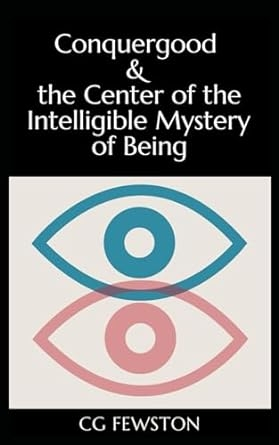
Conquergood & the Center of the Intelligible Mystery of Being
A lone human in a synthetic world is undone by unanswerable questions in the unsettling dystopian novel Conquergood & the Center of the Intelligible Mystery of Being.
In CG Fewston’s dystopian novel Conquergood & the Center of the Intelligible Mystery of Being, a man on the outskirts of society hopes to reunite with his brother.
Acting on flashbacks of growing up with a twin, Jerome leaves his adopted squatter family and desolate urban setting to find that twin. He moves to a place that’s controlled by the Korporation, which has either saved or destroyed the world, depending on who’s asked. There, he meets Korporate scientists and the specimens they create. He also falls in love and becomes a valued employee, though his tasks are underexplained. And while fulfilling the Korporation’s special missions, he learns more about himself and about his twin, Vincent. But he also comes to question the part that the Korporation plays in people’s lives. His loyalties are tested and as he encounters obscured, forgotten wisdom in the Korporation’s library.
Jerome’s interactions with his loved ones are touching, though they’re outweighed by the world’s more worrisome elements. Jerome is made to personify the difficulty of knowing who one is in a corporate culture. The knowledge that he has at the beginning of the book, including his knowledge about himself, is undone. And the less he knows, the more corporate conspiracies are able to fill the void in his mind. At his opposite, the Korporation is rendered villainous and detached.
Like the reeducation that Jerome is subjected to upon his arrival in Korporation space—which upends reason as Jerome knows it, introducing new calendar terms, definitions of identity, and uses for time—the plot is quite nebulous. Made up of a series of short, disconnected lectures and interviews, the chapters proceed in backwards order. Jerome’s days are jumbled, and accounts of them are mixed with reflections and memories; they are further muddled by opium use and an excursion. Additionally, the prose is disorienting: the chapters often begin with literary quotes that link the reigning paradigm to ancient ways; others include propaganda and competing messages. And long periods of Jerome’s free time are spent with his lover or with his own thoughts, described using ample adjectives and philosophical terms.
A lone human in a synthetic world is undone by unanswerable questions in the unsettling dystopian novel Conquergood & the Center of the Intelligible Mystery of Being. The book’s conclusion circles back to the question of who Jerome is—so much so that the surprises of its discovery-filled climax are subdued, obscured by increasing chaos and disaffection.
Reviewed by
Mari Carlson
Disclosure: This article is not an endorsement, but a review. The publisher of this book provided free copies of the book and paid a small fee to have their book reviewed by a professional reviewer. Foreword Reviews and Clarion Reviews make no guarantee that the publisher will receive a positive review. Foreword Magazine, Inc. is disclosing this in accordance with the Federal Trade Commission’s 16 CFR, Part 255.
